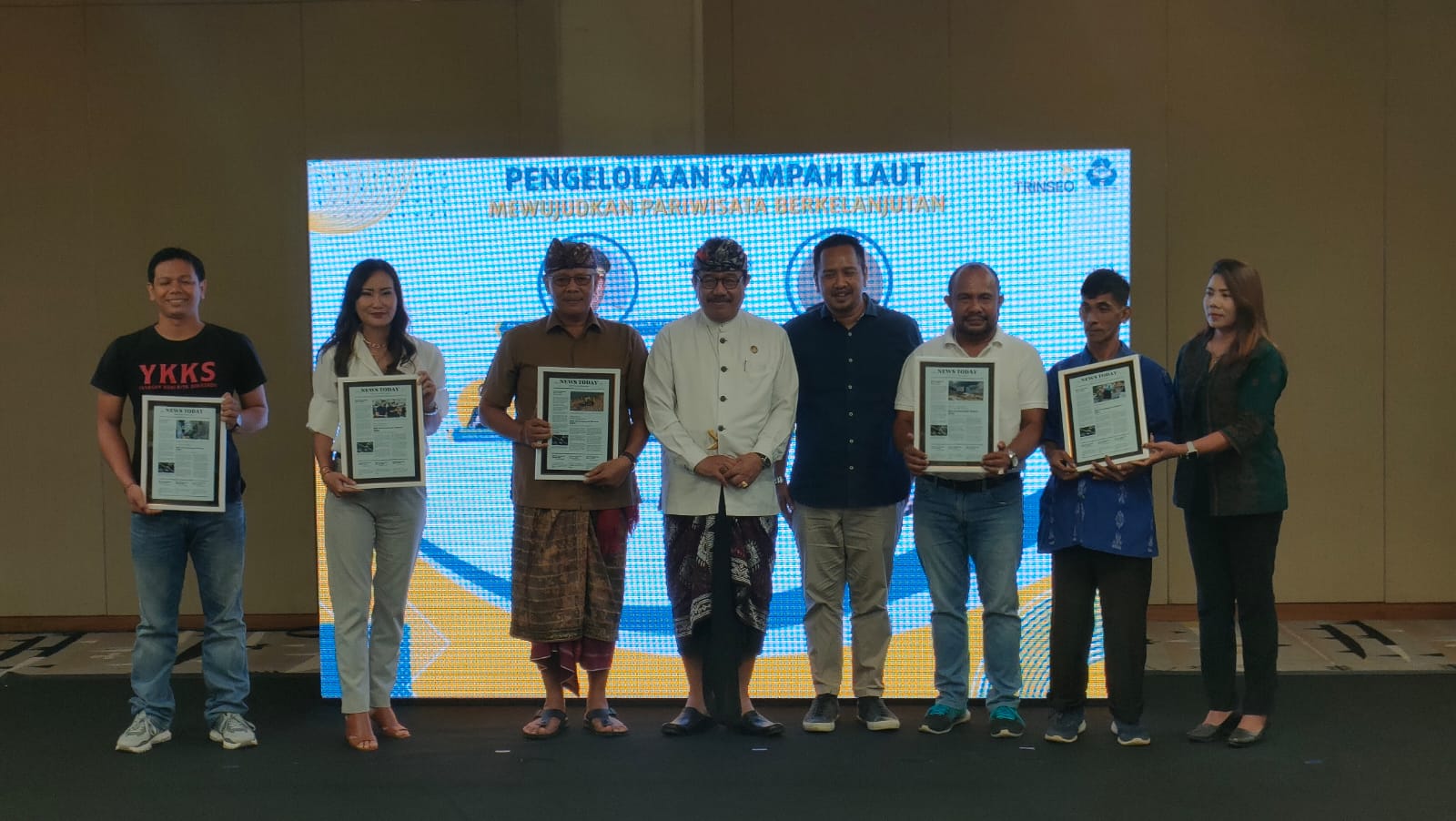BALI – Plastic pollution in the sea is a complex problem and knows no national or regional boundaries. The problems come not solely directly from the sea, but further upstream, such as how the industry produces and distributes plastic products, to the point where the most important is how consumers or the public handle the waste they produce. This is a long chain of plastic value cycle (life cycle).
Seeing the marine waste problem that is currently happening on the beaches of the southern part of the island of Bali, Yok Yok Let’s Recycle! (YYADU!), which is a plastic recycling advocacy and education program, continues to strive to present solutions and increase awareness of waste handling and management through penta helix collaboration involving several parties, namely government, society and communities, academia, industry, and also publications / media .
To raise this awareness, a seminar was held at Maya Hotel Sanur, on Saturday (10/12/2022). Through the seminar “Yok Yok Ayok Recycle: Manage Marine Waste to Realize Sustainable Tourism” Minister of Tourism and Creative Economy, Sandiaga Salahuddin Uno said that according to the Sustainable Travel Report, 83% of tourists consider sustainable travel important and 62% of global tourists prefer destinations and eco-certified accommodation. The Ministry of Tourism and Creative Economy is trying to respond to changes in global tourism trends by developing tourist destinations to become smart-green destinations.
“The imbalance between socio-culture as well as the economy and the environment is PR (homework), where one of them is responsible waste management. To realize this real action, it needs to be complemented through a process of communication, information, education and outreach,” said the Indonesian Minister of Tourism and Creative Economy, Sandiaga Uno.
Vice Governor of Bali, Prof. Tjokorda Oka Artha or who is familiarly called Cok Oka on the same occasion also said that the tourism sector in Bali is currently recovering. The transition period for the return of tourists to Bali must be balanced with the readiness of tourist destinations from aspects such as cleanliness.
“Caring for the environment has long been the responsibility of the Balinese people to protect Balinese wisdom. However, along with the transformation of livelihoods, there is a vacuum of responsibility. This obligation needs to be remembered and re-implemented in the present,” explained Prof. Tjokorda Oka Artha, Deputy Governor of Bali Province.
The environment including the beach has many functions for the people of Bali, most of whom are surrounded by beaches, ranging from cultural functions, conservation, transportation, and others. However, problems related to waste pollution cannot be avoided, starting from wood waste at certain seasons, liquid waste, even oil waste in port areas.
“Responding to this, we have tried from upstream to downstream to pay attention to environmental issues, from mountains, lakes, rivers, springs to beaches and the sea, because speaking of the environment is multi-sectoral in nature. Based on the Governor’s policy regarding source-based waste management, we continue to work to increase public awareness regarding its implementation,” explained I Made Teja, Head of the Bali Province Environment Agency.
The joining of the government through the Bali Provincial Environmental Service, the public and communities through the Bali Waste Cycle, the Bali Tourism Board, and the Greeneration Foundation, media publications through the Waste Care Journalist Network, and the industry through PT Trinseo Materials Indonesia in the YYADU! advocacy and education program! is expected to present a solution for handling waste, especially in Bali which is currently focusing on marine debris.
“Currently, every day we (Bali) always have visitors, both domestic and foreign as many as 40,000 visitors by air, sea and land. Sea travel, which is generally done by cruise, is always a potential for marine pollution,” said Ida Bagus Agung, Chair of the Bali Tourism Board.
In its efforts to develop sustainable tourist destinations, the Bali Tourism Board also adds that cleanliness is a major factor that needs attention, especially in terms of waste management. However, overcoming the waste problem needs to be seen as a whole or holistically. In fact, data from several sources say that currently 80% of marine debris in Indonesia comes from land and 30% is categorized as plastic waste. Public awareness to sort and manage waste will support the waste management ecosystem so that waste does not end up polluting the environment. In addition, waste that is properly managed can generate added value which can drive a circulatory economy.
“Through the Bali Waste Cycle, we educate, carry out transportation, collection, and processing. So that the synergy of various parties needs to be done. Waste that has been sorted and managed properly will make it easier for the next process, namely recycling in order to maintain a truly BALI Province, Clean, Asri, Sustainable and Beautiful,” said Putu Ivan Yunatana, Founder of Bali Waste Cycle.
Referring to Law no. 18 of 2008 concerning waste management, this waste responsibility is not only the responsibility of one party (the government), but also producers as producers of waste to participate in the waste management and recycling ecosystem which is also clearly stated in Article 15, where producers responsible for the packaging.
Representing the industry, Hanggara Sukandar as the Director of Environment & Sustainability Affairs Responsible Care®️ Indonesia also stated that the process of sorting plastic waste will support the recycling process which can now be done with the continued development of technology.
“There are many types of plastic that can be recycled, starting from PET, PS, PP, and others. However, socialization regarding the management and sorting of this type of plastic waste still needs to be carried out because not all people understand this,” said Hanggara Sukandar, Responsible Care® Indonesia.
Socialization activities as a way to deal with waste problems that affect cleanliness or health in tourism locations can be carried out by anyone, one of which is also carried out by environmental organizations, the Greeneration Foundation, which conveys that tourism locations also need to be the main focus in maintaining a clean environment. clean.
“As one of the organizations that focuses on the environment, we have carried out many field activities. We also carry out a lot of beach cleaning programs resulting from marine debris, although currently we are still focusing on the island of Java. However, we see Bali as a tourism destination that is always in the spotlight for local and foreign tourists, and we are moved to participate in this cleaning activity going forward,” said M. Fahrian Yovantra, Head of Programs Greeneration Foundation.
Various parties support to be involved in tackling the waste problem. One of them is the media as a place to convey messages to the wider community to provide education and outreach regarding waste management.
“We must support in terms of publications to convey the solutions that have been presented by the industry and fellow activists in the field. However, on the one hand, the government also needs to act decisively in implementing rewards and punishments against regulations governing waste management activities.” closed Agustinus Apollo Daton, Head of the Garbage Care Journalist Network.***


